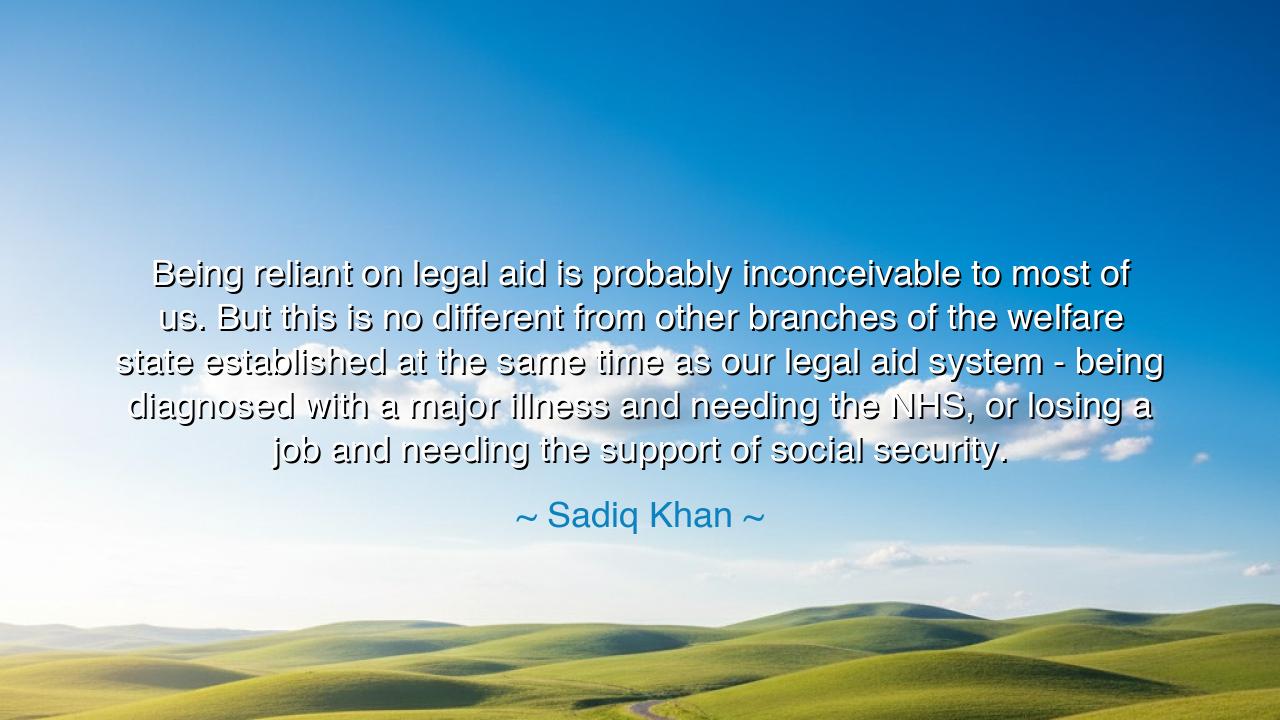
Being reliant on legal aid is probably inconceivable to most of
Being reliant on legal aid is probably inconceivable to most of us. But this is no different from other branches of the welfare state established at the same time as our legal aid system - being diagnosed with a major illness and needing the NHS, or losing a job and needing the support of social security.






The words of Sadiq Khan carry the weight of both compassion and justice: “Being reliant on legal aid is probably inconceivable to most of us. But this is no different from other branches of the welfare state established at the same time as our legal aid system — being diagnosed with a major illness and needing the NHS, or losing a job and needing the support of social security.” These are not the words of convenience or comfort, but of remembrance — a reminder that the pillars of civilization stand strongest when built upon justice, mercy, and equality. For in these words lies the eternal truth that law, like medicine or sustenance, must not be the privilege of the few, but the birthright of all.
In the ancient cities of wisdom — Athens, Rome, and beyond — the concept of justice was held sacred. Yet even in those shining ages, access to justice often bowed before wealth. The poor man’s voice was drowned by the sound of coin and influence. It was not until the modern age that nations began to understand that legal aid is as vital as healing the body or feeding the hungry. Just as the NHS rises to protect the sick, and social security lifts those struck by misfortune, so too must the law defend the weak and guide the lost. For justice denied to one becomes justice endangered for all.
Khan’s reflection is not born merely of political thought, but of lived truth. As a lawyer and son of immigrants, he speaks for those whose struggles are often unseen — for the single mother facing eviction, the worker wronged by deceit, the youth accused without defense. To them, legal aid is not a luxury, but a lifeline. It is the bridge between despair and fairness, between silence and the right to be heard. Without it, the law becomes a fortress with closed gates — guarded by power, indifferent to pain.
Consider the story of Clarence Earl Gideon, a man of meager means in America, who was accused of theft in 1961. Denied a lawyer because he could not afford one, he stood alone before the court and was swiftly convicted. Yet from his prison cell, he wrote a humble petition — handwritten, heartfelt — to the Supreme Court of the United States. In 1963, that Court declared that every person, rich or poor, is entitled to legal counsel. This became the landmark case of Gideon v. Wainwright, a turning point in the history of legal aid. From the suffering of one forgotten man, the principle was born that justice must not depend on wealth.
This truth, Khan reminds us, is no less noble than the creation of the welfare state itself. The founders of modern Britain knew that a civilized nation cannot leave its people to perish in sickness, hunger, or injustice. To need help — be it from the NHS, from social security, or from legal aid — is not a mark of weakness. It is the recognition of shared humanity. To build such systems is to declare that society itself is responsible for its own fairness. In this light, legal aid is not merely charity; it is the defense of dignity.
There is great wisdom in remembering that none are immune from fate’s turn. Today’s prosperous man may tomorrow stand accused, ill, or destitute. When that day comes, he too will seek the arms of compassion that once he took for granted. Equality before the law is not an abstract phrase — it is the shield that protects every citizen, high or low, from the storms of injustice. When that shield weakens, tyranny enters quietly, disguised as indifference.
Therefore, let the lesson of these words be carved in the heart: a just society is one that stands beside its most vulnerable. Do not look upon those who seek legal aid as beggars of mercy, but as rightful heirs to justice. Protect these systems, for they are the heartbeat of a moral nation. Support the institutions that heal, that feed, and that defend, for in defending them, you defend yourself and all humankind.
So I say to you — when you see injustice, speak; when you see the powerless, stand with them; and when you wield privilege, use it not to rise higher, but to lift another. For the strength of a people is not measured by how the mighty are treated, but by how the weak are defended. In this, Sadiq Khan’s truth endures: that justice, like health and welfare, must belong to everyone — or it belongs to no one at all.






AAdministratorAdministrator
Welcome, honored guests. Please leave a comment, we will respond soon